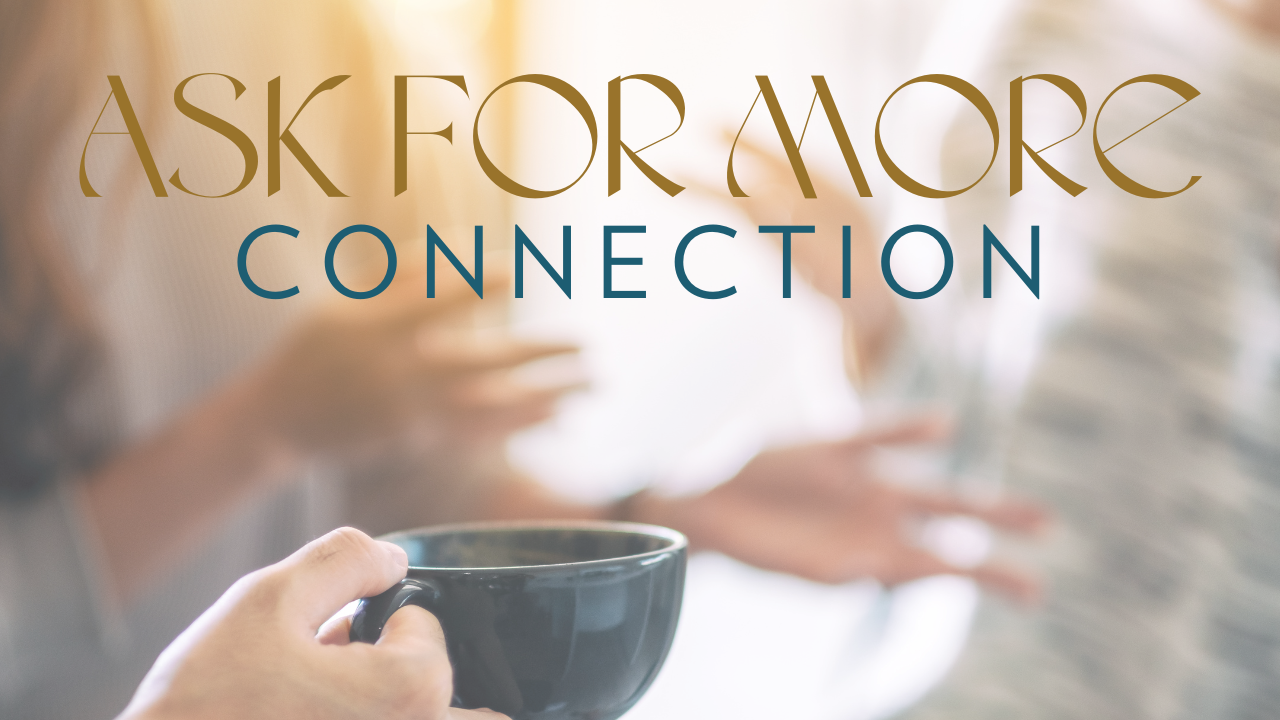Ask for More Connection
Aug 11, 2022
We’re continuing the theme of how we ask for more of what we want and need, and this time, it’s more connection.
Human beings are social creatures. We have evolved to thrive on interacting with other people and the wider world around us.
Research shows that the connections we build help us to feel valued and accepted and provide us with a sense of belonging. People who enjoy strong relationships with a partner, family or friends are happier and healthier, while various studies have even discovered that simply talking to a stranger on the street can lift our frame of mind.
One of the most comprehensive and longest-standing research projects in this area is ‘A Harvard Study on Adult’s Life and Happiness’. Starting in 1938, researchers have been tracking the lives of 724 men – half of whom were students at Harvard College, the other group being boys from the most disadvantaged areas of Boston.
The study follows up with these men every year, asking them about work, family, and health, and they also provide medical records and undergo brain scans. One of the subjects went on to become the 35th President of the United States - John. F. Kennedy! Over time, wives and families were also included in the study and several of the men are still alive today, continuing to participate in the project.
So, what can we learn from over 80 years of dedicated observation? Well, happiness is far removed from working harder, earning more money, becoming famous or consuming material things. “The clearest message we get... is good relationships keep us happier and healthier,” says Dr Robert Waldinger, the current director of the study. “People who are more socially connected to family, to friends, to the community, are happier, they’re physically healthier and they live longer than people who are less well connected.”
Supporting my clients to create more meaningful connections is one of the seven pillars of The Live Powerfully Programme. Here are my thoughts on how to nurture the relationships that boost our happiness and wellbeing:
Appreciate Our Loved Ones
Our closest attachments with family and friends are the cornerstones of our lives. Given the health benefits they offer us, we should view looking after these relationships as a form of self-care.
Unfortunately, we often take our nearest and dearest for granted. It takes conscious attention and effort but there are things we can do that make a difference. Start by letting others know how much they mean to us and show gratitude for the difference they make in our lives. Prioritise time to spend together, e.g., cooking a meal, taking a walk, or meeting up online for a catch-up.
Sharing memories builds closeness and trust and protects the connections that make us happy.
Nurture Your Support Network
By forging close friendships, we create a network of people to turn to when we experience
difficult times. Having a robust social network and support system of people who are there to
listen and offer help can help us to deal with tough times. We can move forward more easily than those dealing with problems alone. For many, this has taken more effort since lockdown.
And being there for our friends and family, when they need us in return, will make us feel valued and strengthen our bonds.
Connect at Every Stage of Life
We know that loneliness can have a harmful impact on life expectancy. By contrast, people who enjoy stable, supportive relationships have better memories and brain recall. This becomes tricky as we get older, but social ties are important throughout our lives. Try connecting with the wider community, such as neighbours or work colleagues. It feels good to engage with people who share our interests and values.
Nurture Healthy Relationships
When it comes to connections, it is quality as well as quantity. We may have dozens of acquaintances; however, we need people we can rely on with no judgements or negativity. Being aware of the nature of our closest connections is so important and a secure, balanced relationship with our partner is vital.
“You can be lonely in a crowd and you can be lonely in a marriage,” says Waldinger. “High-conflict marriages, without much affection, turn out to be very bad for our health, perhaps worse than getting divorced.”
Or we may be stuck in a toxic friendship which exploits our people-pleasing tendencies. Becoming aware of relationships that are no longer serving you is the first step to addressing them.
The number of daily interactions is important too and studies show the lack of this had a detrimental effect overall during lockdown.
Introverts Still Need Connection
Ironically, although introverts crave meaningful connections with others, engaging and nurturing relationships with fellow humans can feel daunting. Knowing that loneliness is detrimental to our wellbeing, it’s crucial we reach out and connect where we can – particularly if we notice someone struggling.
As an ambivert, I thrive off connection but also need time by myself to recharge too. Whatever our preference, we all deserve to build connections that support and enrich us every day
Everyone deserves to have a brilliant, healthy, happy life full of meaning and love. So, it’s time to start asking for more connection in your life.
As ever, if you need more support with this, book a free call and find out how I can help you.
Want to find out more about how I can support you to Thrive Resiliently?
Are you moving towards burnout? Tired of just coping?
Join my thrive in 5 challenge. 8 days. Self Paced. 5 minutes a day. Designed for busy, smart women who are fed up of surviving and are ready to thrive!
We hate SPAM. We will never sell your information, for any reason.


